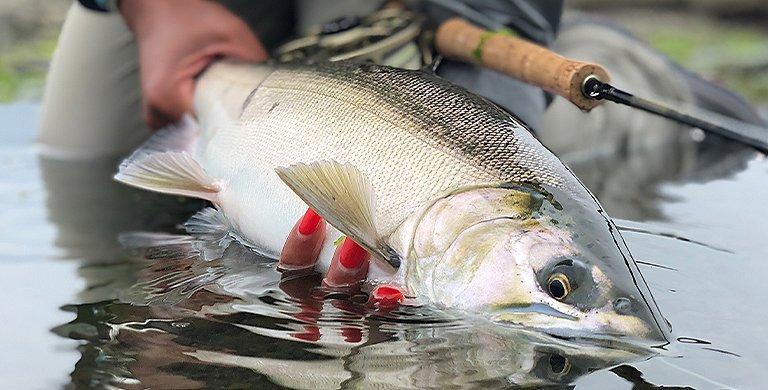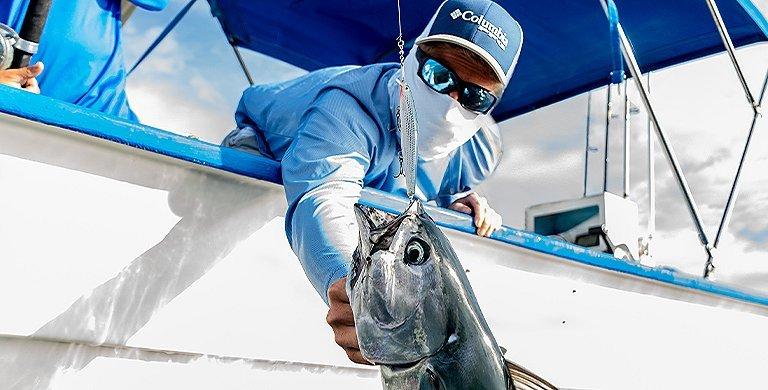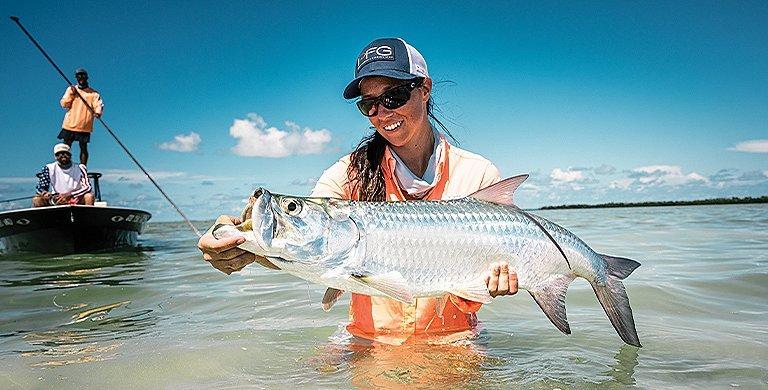FISHING
How Fly Fishing Can Help Men Navigate Mental Health Struggles
An Oregon therapist is helping men with depression, anxiety, and other mental health needs by teaching them to fish
BY RACHEL CAVANAUGH
“You’re on the water learning to fly fish, but then you start noticing the water and how beautiful it is. You start noticing the birds, the trees. Over time, you’re learning to build a connection to nature through this experience.”
Dr. Ryan Reese, founder of Fishing for Wellness
When it comes to masculinity, a lot has changed in the past few decades. Gender norms have become more fluid and the dialogue around men’s roles has shifted. Yet despite the changes, many things remain the same, particularly when it comes to the ways in which men talk about their feelings. Or don’t talk about them, as is often the case.
According to Dr. Ryan Reese, a licensed professional counselor in Bend, Ore., men today seem to understand that it’s healthy for them to express emotions and show vulnerability—they just don’t always know how to do it.
“Men have this awareness that it’s OK for them to have feelings and talk about their emotions, but they’re still clueless about how to do so,” Reese explained. “The ones I see in my practice are still really feeling stuck with some of these sociocultural norms around masculinity.”
This can lead to a variety of negative impacts on their health, family lives, and careers, he said. One of the biggest setbacks he’s observed in his practice is that men often have a hard time developing meaningful connections with other people. They have plenty of casual friendships but lack the interpersonal skills to take those relationships to the next level.
“There are elements of [building friendships] that require vulnerability,” Reese said. “And not only that, you have to know what questions to ask. Males are developing these more superficial connections where they may have drinking buddies, fishing buddies, whatever—but how deep are those connections actually going?”
Feeling like you're part of a community is a significant predictor for resiliency, he explained, so an inability to connect more deeply can create challenges for their mental health, such as anxiety, depression, and other disorders.
“What I see with males is that they tend to drift and have a tendency to isolate,” Reese said. “When people feel isolated, they’re more prone to engage in coping mechanisms that are going to be adverse to their health.”
According to Dr. Ryan Reese, a licensed professional counselor in Bend, Ore., men today seem to understand that it’s healthy for them to express emotions and show vulnerability—they just don’t always know how to do it.
“Men have this awareness that it’s OK for them to have feelings and talk about their emotions, but they’re still clueless about how to do so,” Reese explained. “The ones I see in my practice are still really feeling stuck with some of these sociocultural norms around masculinity.”
This can lead to a variety of negative impacts on their health, family lives, and careers, he said. One of the biggest setbacks he’s observed in his practice is that men often have a hard time developing meaningful connections with other people. They have plenty of casual friendships but lack the interpersonal skills to take those relationships to the next level.
“There are elements of [building friendships] that require vulnerability,” Reese said. “And not only that, you have to know what questions to ask. Males are developing these more superficial connections where they may have drinking buddies, fishing buddies, whatever—but how deep are those connections actually going?”
Feeling like you're part of a community is a significant predictor for resiliency, he explained, so an inability to connect more deeply can create challenges for their mental health, such as anxiety, depression, and other disorders.
“What I see with males is that they tend to drift and have a tendency to isolate,” Reese said. “When people feel isolated, they’re more prone to engage in coping mechanisms that are going to be adverse to their health.”
Fishing can be therapeutic for men with anxiety, depression, and other mental health struggles, according to Dr. Ryan Reese, a licensed professional counselor in Bend, Ore.
Fishing as therapy
To help counter some of these negative effects, Reese runs a group therapy program called “Fishing for Wellness.” During the eight-week course, participants learn fly-casting skills while also sharing personal struggles and engaging in mindfulness exercises.
The participants typically come from social outreach groups tackling things like substance abuse, housing insecurity, incarceration, or other issues. The program is open to anyone, but Reese says it’s been predominantly men’s groups that have expressed interest.
One of the main goals of the program is to teach participants about mindfulness and how they can use it as a tool for stress reduction. During each session, the facilitator chooses a different mindfulness concept to focus on for that day, for example, “non-judgment,” “acceptance,” or “letting go.”
Once they’ve discussed the topic at length, the participants break into smaller groups where they’re asked to incorporate the concept into their fly-casting techniques.
“Let’s say the focus is on non-judgment that week,” Reese explained. “We’ll say, ‘We want you to focus on keeping your wrist straight and keeping your elbow parallel to the ground. But while you're doing it, notice and pay attention to the judgments you have about yourself or the experience.’”
The participants typically come from social outreach groups tackling things like substance abuse, housing insecurity, incarceration, or other issues. The program is open to anyone, but Reese says it’s been predominantly men’s groups that have expressed interest.
One of the main goals of the program is to teach participants about mindfulness and how they can use it as a tool for stress reduction. During each session, the facilitator chooses a different mindfulness concept to focus on for that day, for example, “non-judgment,” “acceptance,” or “letting go.”
Once they’ve discussed the topic at length, the participants break into smaller groups where they’re asked to incorporate the concept into their fly-casting techniques.
“Let’s say the focus is on non-judgment that week,” Reese explained. “We’ll say, ‘We want you to focus on keeping your wrist straight and keeping your elbow parallel to the ground. But while you're doing it, notice and pay attention to the judgments you have about yourself or the experience.’”
“It's not necessarily about fly fishing. It's about finding some kind of pathway or gateway to nature connection. Whether it's biking, hiking, picnicking, rock climbing, whatever it may be. As long as it is challenging and allows a person to be mindful.”
Dr. Ryan Reese, founder of Fishing for Wellness
While they learn about mindfulness techniques, participants also get a crash course in managing and expressing their emotions.
“Learning how to fly-cast can be stressful, particularly in the presence of other people,” Reese said. “If you're a macho type of person, fly-casting can be challenging because you can’t just pick up the rod and have a beautiful cast the first time. It's gonna be objectively a mess when you're first getting going.”
Yet throughout the course of the program, they learn how to handle their feelings of frustration, anger, or embarrassment.
“The idea is that folks are building a greater sense of self-awareness,” he said. “Awareness of emotions, awareness of thoughts, and physical reactions. Noticing their patterns of thinking that may be coming up or emerging. And also building self-efficacy. That, to me, is foundational to any treatment paradigm.”
“Learning how to fly-cast can be stressful, particularly in the presence of other people,” Reese said. “If you're a macho type of person, fly-casting can be challenging because you can’t just pick up the rod and have a beautiful cast the first time. It's gonna be objectively a mess when you're first getting going.”
Yet throughout the course of the program, they learn how to handle their feelings of frustration, anger, or embarrassment.
“The idea is that folks are building a greater sense of self-awareness,” he said. “Awareness of emotions, awareness of thoughts, and physical reactions. Noticing their patterns of thinking that may be coming up or emerging. And also building self-efficacy. That, to me, is foundational to any treatment paradigm.”
A number of organizations including Fishing for Wellness, Get Fishing for Wellbeing, Warriors and Quiet Waters, and Fishing the Good Fight use fishing as a means of helping people struggling with mental health issues.
A silent epidemic
Reese’s program is similar to projects like Get Fishing for Wellbeing, Warriors and Quiet Waters, and Fishing the Good Fight, all of which connect people struggling with mental health issues to fishing resources and opportunities.
According to the National Institute of Mental Health, 6 million men are affected by depression every year in the United States. And while this number is smaller than it is for women, studies show that men are far less likely to seek help.
Not only that, more than 3 million men have an anxiety disorder of some kind; one in five men develop alcohol dependence during their lives; and 90% of all people diagnosed with schizophrenia by the age of 30 are men.
The abundance of mental health challenges, many of which aren’t being properly treated, has led to what some have called a “silent epidemic.” In 2020, for example, the suicide rate for men was 3.88 times that of women, and white males made up 69.68 percent of all suicide deaths. In 2017, the CDC ranked suicide as the eighth leading cause of death for men in the United States.
For men struggling with mental health issues, Reese said fly fishing and other outdoor pursuits can be helpful even outside his program.
On top of the mindfulness aspect, they offer a path to spending time in nature, which Reese says is critical for one’s overall well-being.
“You’re on the water learning to fly fish, but then you start noticing the water and how beautiful it is,” he said. “You start noticing the birds, the trees. Over time, you’re learning to build a connection to nature through this experience.”
Incorporating ways to spend time outside into your day-to-day life is an important component of mental health, he said, pointing to the concept of “EcoWellness.” It doesn’t even have to be fly fishing—any sort of outdoor activity that’s challenging without being overly frustrating can be therapeutic.
Reese suggests activities like hiking or trail running to begin with because they don’t require training and can be done alone.
According to the National Institute of Mental Health, 6 million men are affected by depression every year in the United States. And while this number is smaller than it is for women, studies show that men are far less likely to seek help.
Not only that, more than 3 million men have an anxiety disorder of some kind; one in five men develop alcohol dependence during their lives; and 90% of all people diagnosed with schizophrenia by the age of 30 are men.
The abundance of mental health challenges, many of which aren’t being properly treated, has led to what some have called a “silent epidemic.” In 2020, for example, the suicide rate for men was 3.88 times that of women, and white males made up 69.68 percent of all suicide deaths. In 2017, the CDC ranked suicide as the eighth leading cause of death for men in the United States.
For men struggling with mental health issues, Reese said fly fishing and other outdoor pursuits can be helpful even outside his program.
On top of the mindfulness aspect, they offer a path to spending time in nature, which Reese says is critical for one’s overall well-being.
“You’re on the water learning to fly fish, but then you start noticing the water and how beautiful it is,” he said. “You start noticing the birds, the trees. Over time, you’re learning to build a connection to nature through this experience.”
Incorporating ways to spend time outside into your day-to-day life is an important component of mental health, he said, pointing to the concept of “EcoWellness.” It doesn’t even have to be fly fishing—any sort of outdoor activity that’s challenging without being overly frustrating can be therapeutic.
Reese suggests activities like hiking or trail running to begin with because they don’t require training and can be done alone.
To locate mental health services in your area, check out NIMH’s resources page



